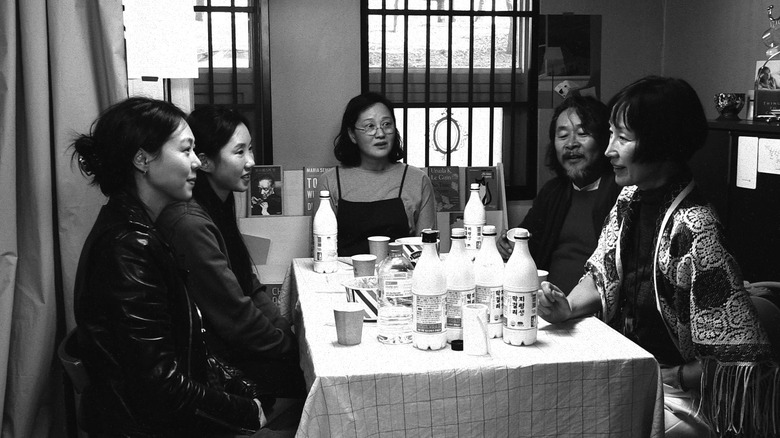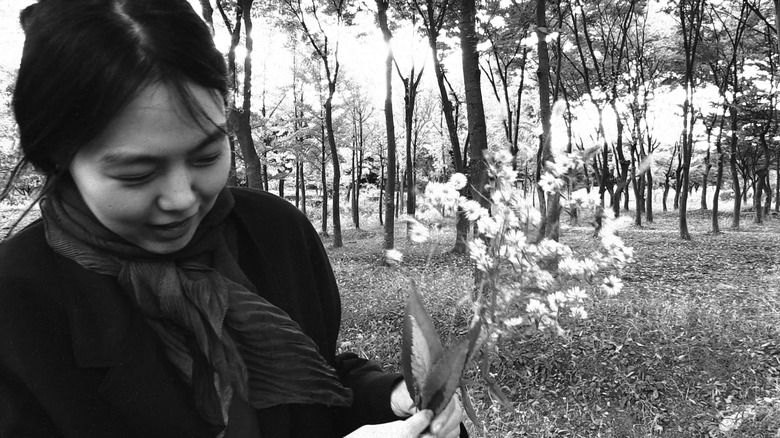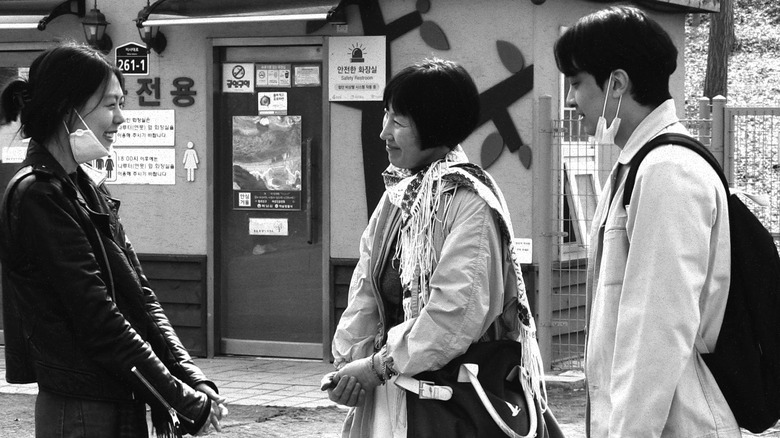The Novelist's Film Review: In Search Of The New
When filmmakers make movies about filmmaking or the lives of those in the business, there is usually either a sense of self-aggrandizement or self-loathing. Some see the need to bolster their chosen art form to reinforce the notion that the work they do is important, and some feel guilty about living their lives for their own creative, selfish pursuits. Much rarer are the works about artists where making films, writing poetry, or acting is all just a part of their lives. That is the world they know — the world they exist in day after day — and maneuver through the ups and downs of normal life like everyone else.
South Korean auteur Hong Sang-soo has built a career on the lives of such people, crafting small-scale realist portraits of artists often stuck in a rut and wanting to carve out a new path for themselves. His latest picture "The Novelist's Film," which won the Silver Bear at this year's Berlin International Film Festival, finds itself firmly in that mold but features a striking sense of urgency about the desire to experiment than you usually see in his pictures, as well as a desire to embrace the unexpected coincidences and signs that pop up in one's own life.
Coming off of playing the lead in Hong's previous film "In Front of Your Face," Lee Hye-young stars as the titular novelist Jun-hee on a trip to a small town to see an old friend (Seo Young-hwa). Jun-hee may be a celebrated novelist, which many of the characters like to remind her, but she hasn't written a word in a long time. What once began as an authentic artistic expression has turned into forcing out regurgitated stories and ideas that, in her mind, have become a bit self-parodic. As she makes her way through what she believed to be a remote town, Jun-hee finds herself running into people she's known in her life, such as a director (Kwon Hae-hyo) who ended up not adapting one of her books to the screen, an actress she admires (Kim Min-hee) who has stepped out of the limelight, and her old poetry-writing drinking buddy (Ki Joo-bong). Through these coincidental meetings, she thinks she has found a new outlet for her artistic expression in trying out making a movie.
It's about truth, not story
As is often the case with the films of Hong Sang-soo, plot is not that important. Jun-hee verbalizes this sentiment in the film when people ask about her film that she hopes Kim Min-hee's Gil-su will star in. She has no time to divulge specific details about story. What drives her is the examination of humanity at its most simple and natural, and the same can be said for Hong. That simplicity is reflected in how he shoots his movies. Every scene is done in one long take with the camera firmly affixed to a tripod. There will be an occasional pan or an even more rare zoom, but the goal of his shooting style is to get every character in the scene to talk about art and life and see their human behavior through the conversation. There are awkward pauses, and people's small talk goes on a little too long. That's just part of life. So, when someone breaks an agreed-upon rule of how we act in polite society, usually with the assistance of some liquid courage, that's where the dramatic high points of the story come from, as they would be in life.
Like Mike Leigh, Hong Sang-soo has a stable of actors who perfectly understand his approach that he can plug and play into any one of his films. Lee Hye-young is a relatively new addition to the group, and her ability to channel those bursts of emotion at the drop of hat through a conversation of perceived niceties feels like Hong Sang-soo directly communicating with the audience. When she berates the film director for thinking Kim Min-hee's character is wasting away her talent and prime years not working with a wide range of major film directors, that rage is palpable, and considering Kim Min-hee herself hasn't worked with anyone else outside of Hong (with whom she has been romantically involved with) since 2016's "The Handmaiden," it feels completely authentic.
It's difficult not to see Jun-hee as anything but an avatar for Hon himself. He, too, has been making a string of movies in a similar vein for a while now, and I wonder how ready he is to break out of his narrative and stylistic conventions, which he has basically mastered at this point. The ending of "The Novelist's Film," which takes advantage of the film's use of black and white to great effect which I do not wish to spoil, certainly signals that could be the case. Though the link between the creator and character is clear, you are never thinking about it at the moment. Jun-hee is her own person, and being a middle-aged woman certainly alters how those around her perceive her as a creative person, though it isn't exactly spoken about.
Familiar for Hong, but nobody does it better
The films I tend to adore from Hong Sang-soo are those that play with the ideas of romance, sex, and gender roles more so than his intense musings on art. "Right Now, Wrong Then," which is about seeing two versions of the same date, is still my favorite of his pictures. When he becomes so hyper-focused on art, some of the conversations can become a little repetitive. That being said, "The Novelist's Film" is one of the best versions of that section of Hong's filmography. He crystallizes a desire and compulsion to create here so beautifully that it can inspire anyone at any stage of life to do so. Everyone is on their own artistic timeline, but when the urge to create strikes you, don't let it pass you by. It's about as honest as a discussion by an artist about art as you can get.
For those new to the work of Hong Sang-soo, I don't know how great of an entry point this would be, as so much of the film is about his own work in a way. Going back and watching films like "Right Now, Wrong Then," "Tale of Cinema," or "The Woman Who Ran" are probably better entry points, but once you are firmly under his spell, "The Novelist's Film" is exactly what you want it to be. The style, tone, and characters will be familiar to you, but there will be a richness that might not be there otherwise. Then again, Hong Sang-soo is a keen observer of humanity and a skilled enough filmmaker that it probably works terrifically on its own.
/Film rating: 8 out of 10


